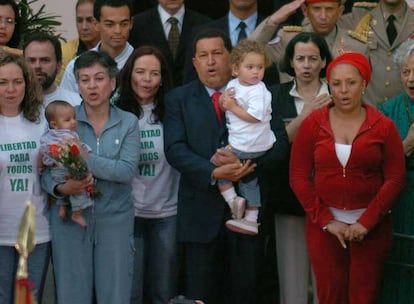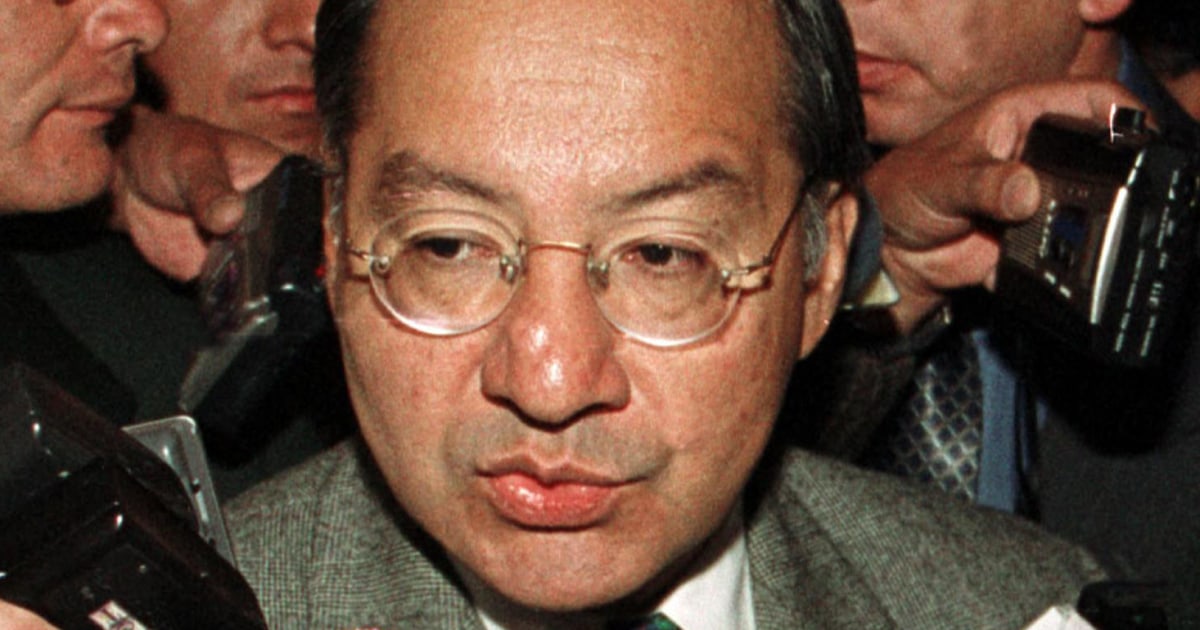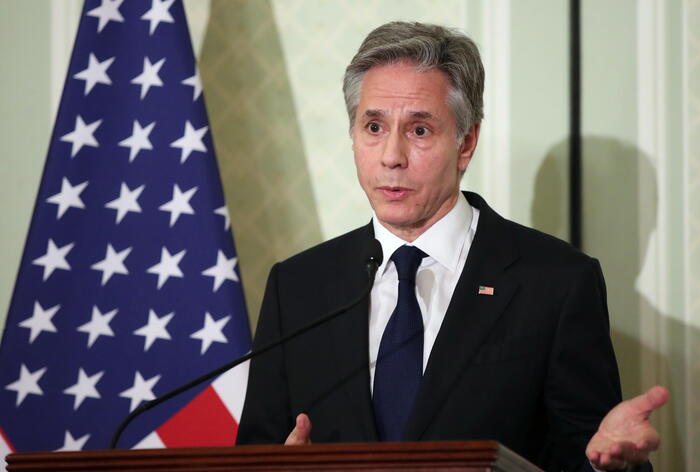Former Colombian senator Piedad Córdoba, right, along with the late Venezuelan President Hugo Chávez and a group of former FARC hostages at the Miraflores Palace in Caracas, in a file image.
The figure of former senator Piedad Córdoba, who aspires to return to Congress, arouses political passions in Colombia.
Many years after having been a kind of mediator between the government of Álvaro Uribe (2002-2010) and the extinct FARC guerrilla in kidnapping cases, the controversy surrounding her role in freeing politicians who They spent long years in the jungle.
Andrés Vásquez, who was Córdoba's communications adviser, accused her of having taken advantage of her closeness to the government of the late Hugo Chávez in Venezuela to advise the rebels and manipulate, with political motivations, the release times of the hostages, particularly that of Ingrid Betancourt.
According to Vásquez's testimony before the Prosecutor's Office, revealed by
Noticias Caracol
, Córdoba had a series of agreements with the leadership of the FARC and the Chavista government of Caracas, "where everyone would benefit."
According to his account, the calculation was that if the hostages were handed over to Chávez, his popularity would increase and that would allow him to win the constitutional referendum on December 7, 2007 –which was rejected at the polls–, while “catapulting” to Córdoba to reach the presidency of Colombia.
He also claims to be a witness that the alias
Teodora
in several intercepted communications to the FARC when they were still armed refers to Córdoba, an old accusation that she has always denied.
The painful chapter of political kidnappings shocked Colombian society, which has suffered all kinds of violence.
And it made Betancourt, who is also a French citizen, the most internationally recognized victim until a military operation freed her in mid-2008. “Piedad had a schedule of her releases in her head.
And she had a schedule of the releases especially by the hierarchy.
Piedad wanted the French government to put pressure on the humanitarian exchange, so Ingrid's not being released first was important to her.
If they wanted to keep France in the peace process, they couldn't free Ingrid," says Vásquez in the recordings.
"In the end, the FARC was the one who decided, Piedad gave recommendations," he adds.
"After a while,
Córdoba has told this newspaper that it is preparing a public statement to refer to the accusations.
Her lawyer, Ximena Castilla, assured
Noticias Caracol
that there is not a single proof that she acted illegally or that she had been a helper or militant of the FARC, or that they had financed her.
She also recalled that, at the time, she received permission from the Uribe Government to mediate in the release of people kidnapped by the FARC.
Córdoba "deliberately delayed my release to obtain political dividends," reacted almost immediately Betancourt, himself a presidential candidate for the Oxygen Green party.
“All this shows is a manipulation of pain that I believe is criminal,” she assured this Monday in statements to the press.
“This also typifies a crime, because she becomes an accomplice in the kidnapping.
Not only because it delays the possible release of those kidnapped, but it puts our lives and those of all those who were trying to free us at risk, ”she valued.
The policy required that the investigations move forward and there are legal consequences.
If Córdoba had any modesty, she stressed, she should renounce her aspiration to Congress.
After decades of a journey that has earned her likes and dislikes, Piedad Córdoba (Medellín, 67 years old) returned last year to the forefront of politics as a candidate for the Senate for the lists of the Historical Pact, the coalition that supports the candidate left-wing presidential candidate Gustavo Petro.
The chances that she will be elected in the legislative elections on March 13 are very high.
She herself was a victim of kidnapping by paramilitaries in 1999. She had already spent 16 years in Congress as part of the Liberal Party and the Attorney General's Office disqualified her in 2010 for alleged links to the FARC – a decision that the Council of State revoked six years later. –.
She never hid her sympathies for Hugo Chavez, and in more recent times she is known as the "godmother" in Venezuela of Alex Saab,
pointed out as figurehead of Nicolás Maduro and extradited to the United States.
Although she has also denied that statement, Vásquez reiterates in her statements that it was Córdoba who originally contacted Saab with Maduro and other Chavista authorities.
The kidnapping was one of the cruelest and most repudiated crimes of the FARC, today disarmed and converted into a political party by virtue of the peace agreement that is already five years old.
A year ago, the Special Jurisdiction for Peace (JEP) charged the guerrilla leadership with a series of war crimes and crimes against humanity associated with the kidnapping, and the former commanders themselves have acknowledged before the court of transitional justice that they systematically kidnapped as one more tactic of the armed conflict.
At the turn of the century, the former Revolutionary Armed Forces of Colombia announced their strategy of kidnapping politicians in order to exchange them for imprisoned guerrillas, a modality that intensified at the end of the government of Andrés Pastrana (1998-2002), after a failed negotiation attempt.
The families of those kidnapped tirelessly pressured the Government to obtain a humanitarian agreement during the two mandates of Álvaro Uribe (2002-2010).
Although this humanitarian agreement never materialized, Piedad Córdoba was authorized by the Colombian government to mediate with the FARC between 2007 and early 2008. The steps taken by the congresswoman, together with Chávez, produced the unilateral release of several kidnapped politicians, such as Luis Eladio Pérez, Gloria Polanco, Clara Rojas or Sigifredo López.
On the other hand, Ingrid Betancourt, together with three US contractors and a group of soldiers who were also in captivity, were only released until July 2008, with the military rescue known as Operation Jaque.
The painful and long chapter of the captivity of politicians resulted in 13 deaths, eight unilateral deliveries, 15 rescued by the Army – among them Betancourt – and two escaped.
The issue is still very present in the public debate, to the point that several ex-kidnapped victims are now also candidates for Congress, like Piedad Córdoba herself.
Subscribe here to the EL PAÍS América newsletter and receive all the key information on current affairs in the region









